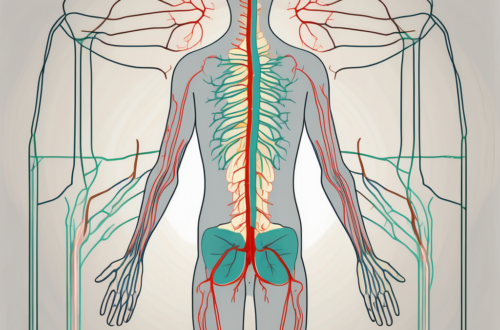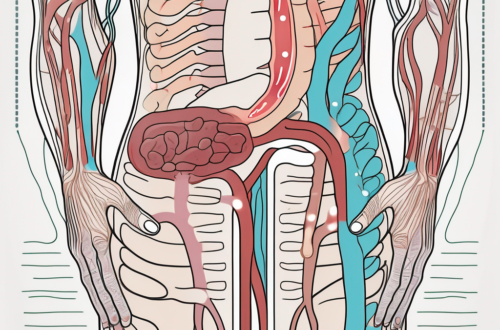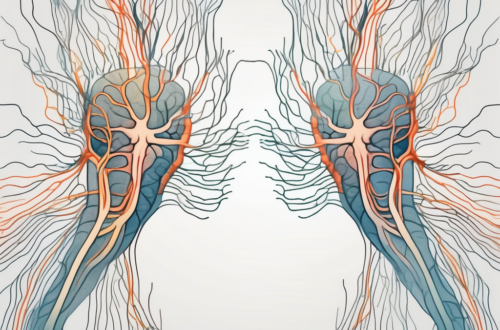In our fast-paced and modern world, stress and anxiety have become all too familiar companions. But did you know that there is a part of our nervous system that plays a crucial role in promoting relaxation and calming the body? It’s called the parasympathetic nervous system, often referred to as the “rest and digest” system. In this article, we will explore how you can boost your parasympathetic nerve with the help of food or medication. Keep in mind that while these methods can support your overall well-being, it’s important to consult with a healthcare professional before making any significant changes to your diet or starting a new medication.
Understanding the Parasympathetic Nervous System
The parasympathetic nervous system is one of the two main divisions of the autonomic nervous system. Its primary function is to restore the body to a state of balance after the “fight or flight” response triggered by the sympathetic nervous system. When the parasympathetic nerve is activated, it slows down the heart rate, lowers blood pressure, and promotes digestion and relaxation. In simple terms, it helps our body find harmony and calmness amidst the chaos of everyday life.
The Role of the Parasympathetic Nerve in the Body
As mentioned earlier, the parasympathetic nerve is responsible for several vital functions in our body. One of its key roles is to stimulate digestion by increasing the production of digestive enzymes and promoting bowel movement. This ensures that our body can efficiently break down food and absorb nutrients, supporting overall health and well-being.
In addition to its role in digestion, the parasympathetic nervous system also plays a crucial role in regulating heart rate. By slowing down the heart rate, it helps to lower blood pressure and reduce the strain on the cardiovascular system. This not only promotes cardiovascular health but also contributes to a sense of tranquility and well-being.
Furthermore, the parasympathetic nerve is involved in promoting relaxation and restorative processes in the body. When activated, it helps to relax muscles, reduce tension, and promote a state of calmness. This is essential for allowing the body to recover and rejuvenate, ensuring optimal physical and mental health.
The Connection Between the Parasympathetic Nerve and Overall Health
Our parasympathetic nerve not only influences our physical well-being but also has a significant impact on our mental and emotional health. When the parasympathetic nervous system is balanced and functioning optimally, it can help reduce stress and promote a sense of calm and relaxation. This, in turn, improves sleep quality, allowing for better rest and rejuvenation.
Furthermore, the parasympathetic nervous system plays a crucial role in supporting immune function. Chronic stress and an overactive sympathetic nervous system can weaken the immune system, making us more susceptible to infections and illnesses. By activating the parasympathetic nerve, we can help strengthen our immune system and enhance our body’s ability to fight off pathogens.
Additionally, research has shown that a balanced parasympathetic nervous system can have positive effects on cognitive function. When we are in a state of relaxation and calmness, our brain is better able to focus, concentrate, and process information. This can lead to improved cognitive performance, including enhanced memory, attention, and problem-solving skills.
On the other hand, an imbalance in the parasympathetic nervous system can lead to various health issues. For example, a dysfunction in this system can result in digestive problems such as bloating, constipation, or irritable bowel syndrome. Cardiovascular disorders, such as high blood pressure or heart palpitations, can also be linked to an impaired parasympathetic response. Furthermore, an overactive sympathetic nervous system and a suppressed parasympathetic response can contribute to anxiety disorders and chronic stress.
In conclusion, the parasympathetic nervous system plays a vital role in maintaining our overall health and well-being. By understanding its functions and the connection between its balance and our physical, mental, and emotional health, we can take steps to support its optimal function. Through practices such as deep breathing exercises, meditation, and engaging in activities that promote relaxation, we can help activate and strengthen our parasympathetic nerve, leading to improved health and a greater sense of harmony in our lives.
The Impact of Diet on the Parasympathetic Nerve
It’s no secret that our diet plays a vital role in maintaining overall health. But did you know that certain foods can promote the health and function of our parasympathetic nerve? Let’s explore some of the top food choices that can naturally boost this important part of our nervous system.
The parasympathetic nerve, also known as the “rest and digest” system, is responsible for promoting relaxation, digestion, and overall well-being. By nourishing this nerve with the right foods, we can enhance its function and support our body’s natural healing processes.
Foods That Naturally Boost the Parasympathetic Nerve
Including foods rich in nutrients like omega-3 fatty acids, magnesium, B vitamins, and antioxidants can help support the health of the parasympathetic nerve. Some examples of these foods include:
- Fatty fish like salmon and sardines: These fish are packed with omega-3 fatty acids, which have been shown to reduce inflammation in the body and support brain health.
- Leafy greens such as spinach and kale: These greens are rich in magnesium, a mineral that helps relax muscles and calm the nervous system.
- Avocados: Avocados are a great source of healthy fats and B vitamins, which are essential for nerve function and overall well-being.
- Nuts and seeds: These crunchy snacks are packed with antioxidants and essential nutrients that can support the health of the parasympathetic nerve.
- Berries: Berries are not only delicious but also rich in antioxidants, which can help reduce oxidative stress and promote overall nerve health.
It’s important to incorporate these foods into a well-balanced diet for optimal results. By including a variety of these nutrient-rich foods in our meals, we can ensure that our parasympathetic nerve receives the nourishment it needs to function at its best.
The Science Behind Food and Parasympathetic Nerve Interaction
The impact of food on our parasympathetic nerve can be attributed to their specific nutrients and their ability to promote relaxation and reduce inflammation in the body. For example, omega-3 fatty acids have been shown to reduce anxiety and improve overall brain health, while magnesium helps relax muscles and calm the nervous system.
Additionally, B vitamins play a crucial role in nerve function and energy production. They help support the health of our nervous system, including the parasympathetic nerve, by aiding in the synthesis of neurotransmitters and promoting cellular energy production.
Antioxidants, found in abundance in berries and other colorful fruits and vegetables, help protect our nerves from oxidative stress and inflammation. By reducing the damage caused by free radicals, antioxidants can support the overall health and function of the parasympathetic nerve.
By understanding the science behind these interactions, we can make informed choices that support our parasympathetic health. Incorporating these nutrient-rich foods into our diet can have a positive impact on our overall well-being, helping us feel more relaxed, energized, and in tune with our bodies.
Medications That Influence the Parasympathetic Nerve
In addition to the powerful impact of nutrition, certain medications can also influence the health and function of our parasympathetic nerve. The parasympathetic nervous system plays a crucial role in regulating various bodily functions, including digestion, heart rate, and relaxation. However, it’s essential to consult with a healthcare professional before considering any medication, as they can provide personalized advice based on your specific needs and medical history.
Over-the-Counter Medications and Their Effects
There are a few over-the-counter medications that can indirectly affect the parasympathetic nervous system. One such medication is antihistamines, commonly used to relieve allergy symptoms. Antihistamines often have a side effect of drowsiness, which can promote relaxation and indirectly stimulate the parasympathetic nerve. This can be particularly helpful for individuals who struggle with anxiety or have difficulty falling asleep. However, it’s crucial to follow the recommended dosage and only use these medications when necessary, as excessive use can lead to unwanted side effects.
In addition to antihistamines, certain herbal remedies and supplements may also have an impact on the parasympathetic nerve. For example, chamomile tea is known for its calming properties and can help promote relaxation by indirectly stimulating the parasympathetic nervous system. Similarly, lavender essential oil has been used for centuries to alleviate stress and anxiety, providing a soothing effect on the parasympathetic nerve. However, it’s important to note that these natural remedies should be used with caution and under the guidance of a healthcare professional, especially if you have any underlying medical conditions or are taking other medications.
Prescription Medications for Parasympathetic Nerve Health
In certain cases, healthcare professionals may prescribe medications that directly target the parasympathetic nerve to address specific conditions. These medications are usually tailored to individual needs and may include cholinergic agonists or anticholinergic drugs.
Cholinergic agonists work by mimicking the effects of acetylcholine, a neurotransmitter that plays a key role in the parasympathetic nervous system. These medications can help stimulate the parasympathetic nerve and improve various bodily functions. They are commonly used to treat conditions such as urinary retention, dry mouth, and certain gastrointestinal disorders. However, it’s important to use these medications under the guidance and supervision of a healthcare professional, as they can have side effects and may interact with other medications.
On the other hand, anticholinergic drugs work by blocking the effects of acetylcholine, thereby reducing the activity of the parasympathetic nervous system. These medications are often prescribed to manage conditions such as overactive bladder, motion sickness, and chronic obstructive pulmonary disease (COPD). Like cholinergic agonists, anticholinergic drugs should only be used as directed by a healthcare professional, as they can have side effects such as dry mouth, blurred vision, and constipation.
It’s important to note that while medications can be beneficial in managing certain conditions and influencing the parasympathetic nerve, they should never be used as a substitute for a healthy lifestyle. Proper nutrition, regular exercise, and stress management techniques are essential for maintaining overall well-being and supporting the optimal functioning of the parasympathetic nervous system.
Balancing Food and Medication for Optimal Parasympathetic Health
When it comes to supporting your parasympathetic nerve health, finding the right balance between nutrition and medication is crucial. Let’s explore some key considerations to keep in mind when structuring your approach.
Creating a Balanced Diet for Parasympathetic Nerve Health
A well-balanced diet that includes a wide variety of nutrient-dense foods is the foundation of supporting your parasympathetic nervous system. Incorporate whole foods, such as fruits, vegetables, lean proteins, whole grains, and healthy fats, into your meals.
Fruits and vegetables are rich in antioxidants, vitamins, and minerals that help reduce inflammation and support overall nerve health. Berries, leafy greens, and citrus fruits are particularly beneficial for their high content of vitamin C, which is known to support nerve function.
Lean proteins, such as chicken, turkey, fish, and tofu, provide essential amino acids that are necessary for the production and repair of nerve cells. Including a variety of protein sources in your diet ensures that you get a wide range of these important building blocks.
Whole grains, such as brown rice, quinoa, and oats, are rich in fiber and B vitamins, which are essential for maintaining a healthy nervous system. These nutrients help regulate neurotransmitter production and support the transmission of nerve signals.
Healthy fats, such as avocados, nuts, and olive oil, are important for nerve health as they provide omega-3 fatty acids and other essential nutrients. These fats help protect nerve cells and promote optimal nerve function.
It’s also essential to listen to your body and make adjustments based on how different foods make you feel. Keep in mind that what works for one person may not work for another, so it’s essential to find what works best for you.
Understanding the Right Medication Dosage for You
If prescription medication is necessary to support your parasympathetic nerve health, it’s crucial to work closely with your healthcare provider to determine the appropriate dosage for your specific needs. Never adjust your medication dosage without consulting your healthcare professional, as doing so can have adverse effects.
Your healthcare provider will consider various factors when determining the right medication dosage for you, including your medical history, current health condition, and any other medications you may be taking. They may also monitor your progress and make adjustments as needed to ensure optimal results.
Regular check-ups and open communication with your doctor are key in ensuring that your treatment plan is effective and tailored to your unique circumstances. Your healthcare provider may also provide additional guidance on lifestyle modifications, such as stress management techniques and exercise, that can complement your medication regimen and support your parasympathetic nerve health.
Potential Risks and Side Effects
While taking steps to support your parasympathetic nerve health can be beneficial, it’s important to be aware of potential risks and side effects associated with dietary changes and medications. Considering these risks will help you make informed decisions and prioritize your safety and well-being.
The parasympathetic nervous system plays a crucial role in regulating various bodily functions, including digestion, rest, and relaxation. However, altering your diet to support this system may have unintended consequences if not approached with caution.
Risks Associated with Dietary Changes
When making significant dietary changes, it’s crucial to consider the potential risks and how they may impact your overall health. For example, an abrupt removal of certain food groups or severe caloric restriction can lead to nutrient deficiencies or other health complications.
It’s important to remember that every individual has unique nutritional needs, and what works for one person may not work for another. Therefore, it’s advisable to consult with a registered dietitian or nutritionist who can guide you through the process and ensure that you are meeting your nutritional needs.
A professional can help you create a well-balanced diet plan that supports your parasympathetic nerve health while also considering other aspects of your overall well-being. They can assess your current dietary habits, identify any potential deficiencies or excesses, and make appropriate recommendations tailored to your specific needs.
Moreover, a gradual transition into a new diet is often recommended to minimize the risk of adverse effects. This approach allows your body to adapt to the changes more smoothly and reduces the likelihood of experiencing any sudden shifts in nutrient intake.
Side Effects of Parasympathetic Nerve Medications
In addition to dietary changes, medications targeting the parasympathetic nerve can also be prescribed to support its function. However, it’s important to be aware that these medications may come with side effects that vary depending on the individual and the specific medication prescribed.
Common side effects of parasympathetic nerve medications include dizziness, blurred vision, dry mouth, difficulty urinating, and constipation, among others. These side effects can vary in severity and duration, and it’s crucial to communicate any concerns or adverse effects with your healthcare provider promptly.
Your healthcare provider will be able to assess your individual circumstances and determine the most appropriate medication and dosage for your needs. They can also provide guidance on how to manage any potential side effects and monitor your progress to ensure the medication is effectively supporting your parasympathetic nerve health.
It’s important to note that not everyone will experience side effects from parasympathetic nerve medications, and many individuals find them to be well-tolerated. However, being aware of the potential risks and side effects associated with these medications allows you to make informed decisions and seek appropriate medical support if needed.
Tips for Maintaining a Healthy Parasympathetic Nerve
Supporting the health of your parasympathetic nerve goes beyond food and medication. Let’s explore a few additional tips to help you maintain a healthy and balanced parasympathetic nervous system.
Lifestyle Changes to Support Parasympathetic Health
Adopting a holistic approach to your well-being is key to maintaining a healthy parasympathetic nerve. Engaging in stress-reducing activities such as meditation, yoga, deep breathing exercises, and spending time in nature can help activate your parasympathetic response. Getting enough sleep, managing stress, regular exercise, and nurturing social connections are also crucial elements in supporting your overall health and well-being.
Regular Check-ups and Monitoring Your Parasympathetic Nerve Health
Regular check-ups with your healthcare provider are essential for monitoring the health of your parasympathetic nerve and addressing any concerns or symptoms promptly. Be sure to communicate openly about any changes you have noticed in your well-being, including physical, emotional, or mental symptoms.
In conclusion, supporting your parasympathetic nerve through nutrition and medication can be an effective way to promote relaxation, well-being, and overall health. However, it’s important to remember that everyone is unique, and what works for one person may not work for another. Consult with a healthcare professional who can provide personalized advice based on your specific needs. By taking a comprehensive approach to your well-being and making informed choices, you can boost your parasympathetic nerve and find harmony in your daily life.





